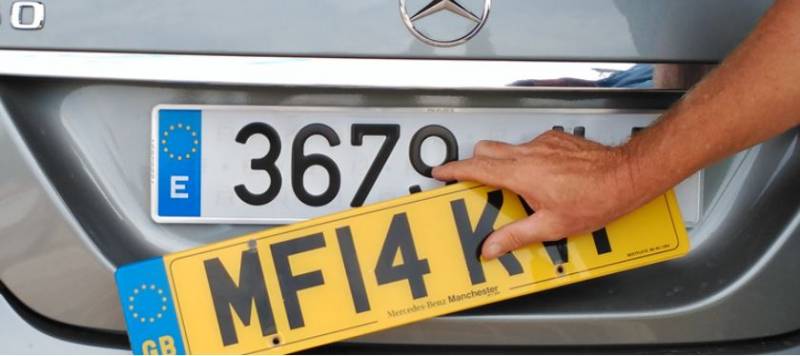Simplified Process to Register a Foreign Vehicle in Spain for Expats
Typical Obstacles Encountered During Foreign Car Registrations and Exactly How to Get over Them
Browsing the complexities of foreign car enrollments can be an overwhelming task, fraught with difficulties that vary substantially throughout territories. Concerns such as figuring out regional policies, getting rid of language obstacles in crucial documents, and reconciling discrepancies in vehicle specifications frequently occur. Comprehending tax implications and compliance with safety criteria can better make complex the process. By analyzing effective strategies to address these barriers, people can better position themselves for a smoother enrollment experience. The inquiry stays: what particular steps can be required to alleviate these typical pitfalls?

Comprehending Regional Laws
Navigating the complexities of international car registration starts with a complete understanding of regional regulations. Each nation has its particular laws and needs regulating the enrollment of automobiles, which can differ dramatically from one jurisdiction to another (Register a foreign Vehicle in Spain). It is critical for foreign lorry proprietors to familiarize themselves with these guidelines to guarantee conformity and avoid possible fines or lawful problems

Furthermore, some territories mandate vehicle examinations to establish compliance with regional safety and discharges requirements. This might require modifications to the lorry prior to it can be lawfully registered. Engaging with local authorities or seeking advice from lawful professionals can supply clearness on these regulations.
Language Barriers in Documents
Language obstacles position significant difficulties when it concerns the paperwork required for foreign vehicle enrollment. Many people come across troubles in comprehending the particular needs detailed in regional laws, as these files are commonly released in the main language of the host country. Misconceptions can bring about the submission of inaccurate or insufficient documentation, resulting in delays or denial of enrollment.
In addition, essential files, such as title actions, evidence of possession, and insurance coverage, may not have easily available translations - Register a foreign Vehicle in Spain. This can produce complication for international vehicle proprietors that are strange with the neighborhood terms and lawful lingo. Because of this, browsing the enrollment procedure comes to be cumbersome, frequently needing extra effort and time to make sure conformity
To alleviate these problems, it is a good idea for international automobile owners to seek professional translation services or consult local experts that can aid in recognizing the requisite documents. In addition, federal government companies may provide multilingual resources or standards to assist in the her comment is here enrollment process. Proactively addressing language barriers can simplify the enrollment experience, making sure that all needed documents are properly ready and submitted according to neighborhood guidelines.
Automobile Spec Discrepancies

Running into car requirements discrepancies can develop significant obstacles for international car proprietors during the registration procedure. These discrepancies commonly arise from differences in making standards, measurement systems, and governing requirements in between the lorry's native land and the host nation. For circumstances, a car that satisfies safety and security and emissions requirements in one nation might not align with the specifications required for enrollment in an additional, leading to delays or outright beings rejected.
To get over these obstacles, it is crucial for foreign vehicle owners to conduct extensive research study content before starting the enrollment procedure. This consists of comprehending the certain demands established by the regional authorities, such as security requirements, discharges levels, and any type of required adjustments. Engaging with a professional service concentrating on international lorry enrollment can likewise offer important insights and assistance in navigating these disparities.
Documents plays a crucial function, so guaranteeing that all technical specifications and alterations are properly mirrored in the paperwork can reduce issues. In addition, keeping open communication with local enrollment authorities can supply clearness on any possible disparities, permitting timely resolution and effective registration of the vehicle.
Browsing Tax Requirements
Recognizing the tax requirements linked with foreign lorry enrollment is important for proprietors seeking to adhere to neighborhood guidelines. Each jurisdiction has certain tax commitments that should be met before a lorry can be lawfully signed up. These may consist of import responsibilities, value-added tax obligations (VAT), and yearly vehicle tax obligations, which can vary substantially depending on the automobile's origin, value, and requirements.
To navigate these tax obligation needs successfully, lorry owners must begin by investigating the details taxes suitable in their location. Consulting with local tax obligation authorities or a tax obligation professional with experience in foreign lorry registrations can offer quality on the process and potential obligations.
In addition, it is important to keep thorough paperwork of the automobile's acquisition and any payments made, as this will be needed for tax estimations and possible audits. Owners should likewise recognize any kind of deadlines related to tax repayments to prevent charges or hold-ups in enrollment.
Examination and Conformity Issues
Routinely attending to assessment and conformity problems is crucial for proprietors of international automobiles looking for to register them in a brand-new jurisdiction. Each region has distinct regulations regarding vehicle safety, emissions, and modifications, which can pose substantial obstacles for proprietors unknown with regional requirements. For that reason, understanding these requirements is crucial to avoid hold-ups and extra expenses.
One usual problem occurs when foreign lorries do not fulfill the host jurisdiction's safety and exhausts requirements. Owners should proactively validate that their cars abide by neighborhood guidelines, website link which may entail adjustments or obtaining essential paperwork from manufacturers. In addition, lots of jurisdictions call for an extensive inspection by an accredited facility, which can bring about additional difficulties if the automobile fails to satisfy specified standards.
To navigate these difficulties, owners can seek advice from local automobile registration authorities or look for assistance from experts acquainted with the registration procedure. Preparing all required documents ahead of time, consisting of previous inspection reports and evidence of compliance, can improve the enrollment process. Eventually, thorough preparation and understanding of inspection demands can dramatically enhance the possibility of an effective international vehicle registration.
Verdict
In recap, the process of foreign automobile enrollment requires various difficulties, consisting of understanding of neighborhood policies, language barriers in paperwork, disparities in vehicle specifications, navigation of tax demands, and assessment and conformity concerns. Addressing these challenges requires thorough research study, application of specialist translation solutions, and consultation with local authorities. Engaging specialized services can ensure adherence to safety and emissions standards, ultimately helping with a smoother registration process and compliance with all relevant obligations.